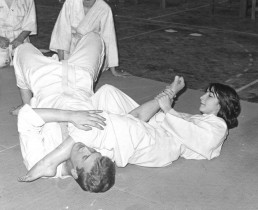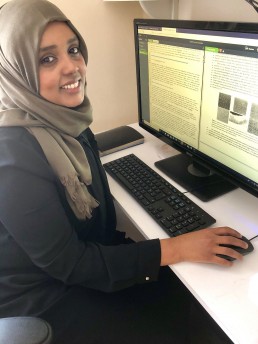In recognition of International Women’s Day, Hamdi Khalif celebrates the past and present achievements of City, University of London’s leading women in STEM.
Since its early days City, University of London has undergone many changes; in its ethos and vision, in the courses it offers and in its student cohort. At one point, it was not uncommon to find lecture theatres packed with men but today, 55% of City’s students are women.
In Victorian Britain when City first opened its doors, it was a rare sight to see women studying at university, much less undertaking courses in Science, Technology, Engineering and Mathematics (STEM). It was then a widely held belief that women were better suited for domestic courses and their primary roles were seen to be homemakers and looking after their husbands and children.
As well as the famous fight for the right to vote, women were also fighting for their education to be taken seriously and to have opportunities to enter the workforce in professions other than the customary teacher, nurse and dress-maker. 151 years since women were first admitted to British universities, this article shares the stories of women at City, University of London who pioneered in STEM subjects. In doing so, they paved the way for many more women to enter similar courses and careers.
Since 1992, the number of female university students has consistently exceeded the number of male students, but the UK still has a long way to go to close the gender gap in STEM subjects. In 2017, only 24% of STEM graduates were women, an indication that men continue to dominate the field. The difference is even more apparent in STEM careers, where women make up only 13% of the workforce.

Shirley Wallis
In January 1956, Shirley Wallis was admitted to the Northampton College of Applied Technology to study Physics on a Ministry Supply Grant. A few years later, in 1960, she became the first woman in Britain to be awarded a Diploma in Technology. In spring of the same year, her accomplishment landed Shirley a feature in The Woman Engineer, the journal of the Women’s Engineering Society. Shortly after, she was employed by the Royal Aircraft Establishment where she joined its radio team in Farnborough.
Marion Salmon
Marion Salmon was one of the first women to study at City when it was still known as the Northampton College of Advanced Technology. She graduated in Industrial Chemistry in 1968.
As one of only three women on her course, Marion knows first-hand what it feels like to be in a male-dominated environment but she was not perturbed and feels it boosted her confidence. She says: “I’m not afraid to question someone if I think they’re wrong” and she attributes this confidence to her time at City.
Marion’s interest in chemistry was first sparked while at grammar school, where her teacher passionately relayed the subject to his students. She mostly enjoyed the hands-on approach to his teaching and feels the experiments went some way towards developing her practical and problem-solving skills. She describes chemistry as akin to cooking and believes “it’s all in the detail.”
Even as recently as the 1960s, it was unusual for women to study courses in STEM. On remembering the reactions of her male classmates, Marion says: “when they [the men] got over the shock, we were treated equally and with respect.” She adds that it was just as easy to be friends with them as it was to be friends with the other two women.
One of Marion’s fondest memories from City was learning Judo in her first year. Here she is training with one of her classmates.

Upon graduating, Marion was employed at the Tropical Products Institute where her role involved analysing the quantity of pesticides residing in food. She then moved to the Edwards High Vacuum Company in Crawley where she used gas liquid chromatography to test the oil of vacuum pumps. Since then, Marion worked for pharmaceutical companies before embarking on a thirty-year career in teaching.
Today, Marion still has the aptitude to learn and take on new challenges. She thrives in manual work, from gardening to mechanics and advocates that: “We should be free to be interested in anything without our gender coming into question.”
Meha Qassem
Dr Meha Qassem is a lecturer in biomedical engineering and has been at City since 2005 when she started a BEng in Biomedical Engineering. Following the successful completion of her undergraduate degree, Meha accepted an internship at Royal College Hospital where she worked as a Clinical Technologist before moving on to positions at BCAS Biomedical Services and TBS GB, both leading specialists in healthcare engineering.
In 2010, she returned to City to enquire about a masters degree and bumped into her former lecturer, Professor Panayiotis (Panicos) Kyriacou, at Northampton Square who encouraged her to enrol for a PhD. Meha followed his advice and was thrilled when she was accepted onto a PhD programme. “I don’t know how I did it,” she remembers and explains that it was not always easy: “When I started my A-levels, there were 29 of us studying engineering and I was the only woman.”
Meha now lectures in the subject and notices a stark difference between how some men and women approach engineering. She explains that men are often more hands-on whereas women sometimes prefer to take a step back and evaluate an experiment before attempting it. “Both approaches are fine,” she says and stresses that academic staff play an important role in encouraging diversity of thought. When her colleagues downplayed her technique, it was her lecturers that reminded her that there are many ways to become an engineer.
Meha was glad to return to research because she feels it’s where she can make the most difference. “It’s not about the money,” she explains, referring to engineering companies and adds “I wanted to develop medical devices that would help to improve people’s health”. And this is exactly what Meha went on to do. The findings of her PhD research, which investigated the use of light in healthcare, are now widely used by colleagues to create medical devices.

Meha feels her PhD greatly helped set the mark for her career and since then, she’s been working with light for the purposes of better health. Her most recent research, funded by Engineering and Physical Sciences Research Council, involves manipulating light and artificial intelligence to measure the levels of lactate in blood. This is particularly important when caring for patients in intensive care who are often at risk from sepsis. Meha explains that lactate is a reliable bio-marker for sepsis and that all current techniques to measure its levels are invasive. But her research could be the answer. Meha hopes that light can one day be used to measure continuously the levels of lactate in patients in intensive care. For patients who are already unwell, Meha’s research can go far to sustain their health.
Many would find Meha’s career audacious which is why it’s surprising to hear that at one point she was dissuaded from studying Physics at A-level. “I was told it’s a guy’s subject and that I shouldn’t study it” she explains. Meha doesn’t want younger women to make the same mistake and advises they ignore any negative comments. “It’s easy to allow negative comments to dictate your life” she says but encourages women to focus instead on the career that lies ahead. She says: “It is important for women to study STEM subjects because the output of these subjects, for example the buildings we live in, the roads we walk on, the cars we drive are all equally used by everyone, so the contribution of women is crucial to ensure we achieve our best.”